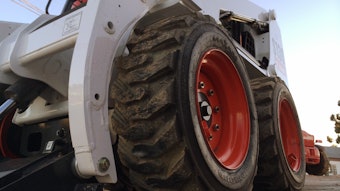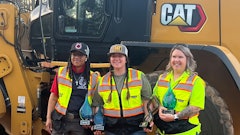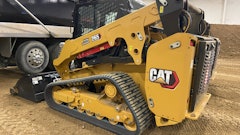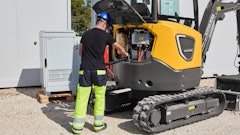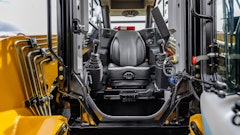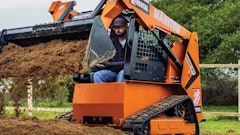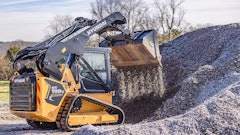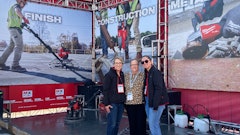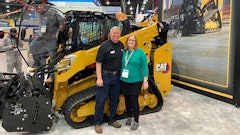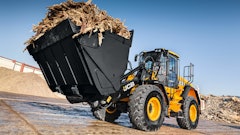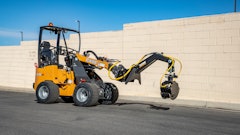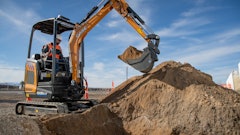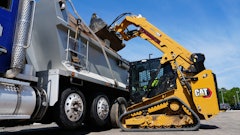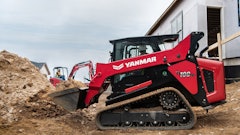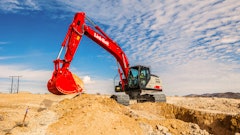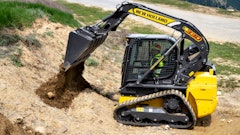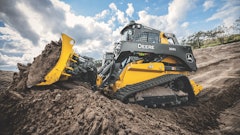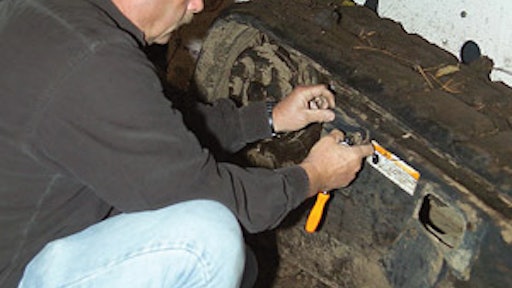
Gregg Zupancic, John Deere product marketing manager, skid steers and compact track loaders, says the first step to making sure your fleet is in working mode — and not in the shop — is to think about maintenance at the time of purchase.
"Choose the manufacturer that offers models with the most uptime and the lowest daily operating costs features for quick and easy service," Zupancic says.
When compact track loaders are designed to be easy to clean and easy to service, it's more likely they will be kept in good working condition, he says.
After you've purchased a new compact track loader and it's arrived safely at its new home, treat it well and it will serve you well in return.
All types of compact equipment (compact track loaders, skid steers, compact excavators) fall into the same general realm of maintenance: checking oil, changing filters, checking fluid levels and so on. Of course it's the tracks that set compact track loaders apart from other compact machines. With tracks comes the need for regular undercarriage cleaning and track adjustment. Unfortunately, these tasks aren't always done regularly and in some cases, they really need to be done daily.
Prioritize maintenance
When maintenance takes a backseat, it ends up costing everyone in the end, says Michael Ross, national product and training manager with Takeuchi. If you have a compact track loader that's due for service, keeping it out at the jobsite (and unserviced) might not be as profitable as you might think. When a machine gets well past its normal interval for maintenance, Ross says existing problems can be further compounded.
Mike Fitzgerald, product representative with Bobcat, gives an example of a machine that's only six hours away from its scheduled oil change. If that machine is going to be gone for a month, he says it's best to do the oil change before the machine goes out — unless a service truck can go out and change the oil in the field.
Operate with care
While track loaders look similar to skid steer loaders and they're built on the same frame, it's critical for operators to understand that a tracked undercarriage system wears differently than tires, Fitzgerald says.
If a contractor is working primarily on pavement, asphalt or rock, a compact track loader might not be the best choice.
"These applications tend to wear the rubber surfaces of the track pads at a fast rate, which will decrease the life of the rubber track," Zupancic says, noting rubber tracks cost significantly more to replace than rubber tires. "The faster the rubber wears, the more often a customer will have to replace the tracks."
If an operator must run a compact track loader on a hard surface, say to load trucks, for example, he suggests sprinkling a material like sand or dirt in the loader's path to reduce track wear.
Taking wide turns instead of skid steering and turning around right on the spot will help minimize undercarriage wear and disturbance to the surface under the machine, he says.
If an operator is working on hard surfaces and then going over curbs, Ross says you'll want to talk about how to approach a curb: perpendicular and slowly.
"Sometimes customers have a tendency to get into a rush and they'll run the machine right over the top of the curb," he says. "That puts a lot of pressure on the tracks and the rollers and could damage the undercarriage."
Pay attention to tension
Anyone operating a compact track loader should know how to properly adjust the tracks. Track sag or tension should be checked daily or weekly (about every 50 hours), depending upon manufacturer recommendations.
"A rubber track system that gets too loose can cause the machine to 'detrack,' in other words, the rubber separates from the undercarriage," Zupancic says.
On the other hand, he says, operating with the rubber tracks on too tight could result in operating inefficiencies — robbing horsepower, burning more fuel, increasing component wear or causing failures.
Track tension usually can be adjusted in a couple of minutes on John Deere models, Zupancic says. "When you have to adjust the track tension, all you need is a grease gun," he explains. "If you have to reduce the tension, a crescent wrench will suffice to turn the grease cylinder zerk counter-clockwise..."
Keep it clean
Compact track loaders are great for use on soft material like dirt and mud, but debris can get packed in the tracks and that can cause trouble. Mud should not be left to dry and bake in the tracks, nor should be allowed to freeze in the tracks.
Every day, dig out mud from tracks, Zupancic recommends. Using a shovel, some compact track loader owners can spend up to an hour per day on this task, he says, so owning a machine with easy undercarriage cleanout is important.
Keeping tracks clean minimizes some of the track wear. When tracks get plugged up with material, the machine needs more power and more fuel.
"It's more efficient to make sure the machine is cleaned on a regular basis," Fitzgerald says.
Many manufacturers have been locating filters remotely for easier access.
Another helpful feature is automatic shut-down. If there's a loss of engine oil pressure, the engine overheats or if the engine water level is low, the engine will automatically shut down, alerting the operator that there's a problem. Warning lights get ignored, Ross says, but no one can ignore an engine shut-down.
To help monitor the number of hours a machine is used and maintain regular maintenance intervals, as well as locate machines on jobsites, more companies have been offering GPS, Ross adds.
"If you maintain a machine regularly and consistently, you're going to have a good machine, and the machine will last longer and perform better," Ross says.
As with many relationships, what you invest, you will receive in return.






